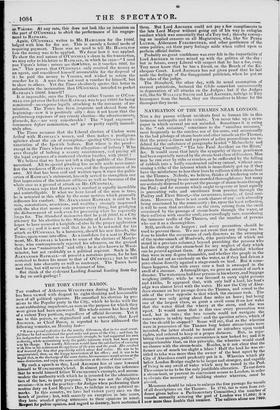THE TORY CHIEF BARON.
THE conduct of Alderman WINCHESTER during his Mayoralty has been viewed with disgust by right-thinking and honourable men of all political opinions. He smoothed his election by pro- mises to the Popular party in the City, which he broke with the mast unblushing impudence, as soon as the purpose for which they were given had been answered. His whole course has been that et a violent Tory partisan, regardless of official decorum. Yet it was to this person, so stigmatized and so unworthy, that Lord itnevasn, as Chief Baron, is reported to have addressed the thllowing remarks, on Monday lastft was a proud reflection for the worthy Alderman, that in the most event- ful dimes be had maintained the good order and peace of the City ; and that, by his independent conduct in an honourable struggle, be had supported his own authority, while maintaining truly the publie interests which had been given iato his charge. The worthy Alderman would have the satisfaction of carrying with him in his retirement the applause of the wise and the good. His conduct lad insured for him that popularity which alone had value. He was to be congratulated, then, on the happy termination of his office; and it was to be 'bored that, in the discharge of the same duties, his successors would arrive at the mune distinction, and enjoy the same satisfaction at the close of their career."
By such a speech as this, Lord ABINGER has at once lowered himself to WINCHESTER'S level. It almost justifies the inference that he would himself follow WINCHESTER'S example, and accom- modate the authority with which be is invested for the administra- tion of the law, to party purposes. There was not the slightest eceasion—it is not the mactice—for Judges when performing their soutine duty on Lord Mayor's Day, to indulge in any political re- marks. In this country, we have had violent party mei] on the bench of justice ; but, with scarcely an exception in late years, they have avoided giving utterance to their opinions in court. Ita-mieet for public opinion, and regard to decency, have restrained them. But Lord ABINGER could not pay a few compliments to the late Lord Mayor without going out of his way to eulogize conduct which was essentially that of a Tory tool ; then eby convey- ing an implied censure on all Magistrates, who, like Sir PETER LAURIE, Alderman FAREBROTHER, and other gentlemen of the same politics, set their party feelings aside when called upon to perform official duties.
Probably no great confidence was ever felt in the impartiality of Lord ABINGER in cases mixed up with the polities of the day : but in future, every Liberal will suspect that he has a foe, every Tory must know that he has a friend, on the Bench of the Ex- chequer Court. Lord ABINGER has not given proof that he laid aside the feelings of the disappointed politician, when he put on the robes of the judge.
The Standard, the other day, with its usual assumption of earnest patriotism, lectured the Globe somewhat unnecessarily in deprecation of all attacks on the Judges: but if the Judges will, like Sir WILLIAM SMITH and Lord ABINGER, indulge in Tory harangues from the bench, they are themselves to blame for the disrespect they incur.


























 Previous page
Previous page